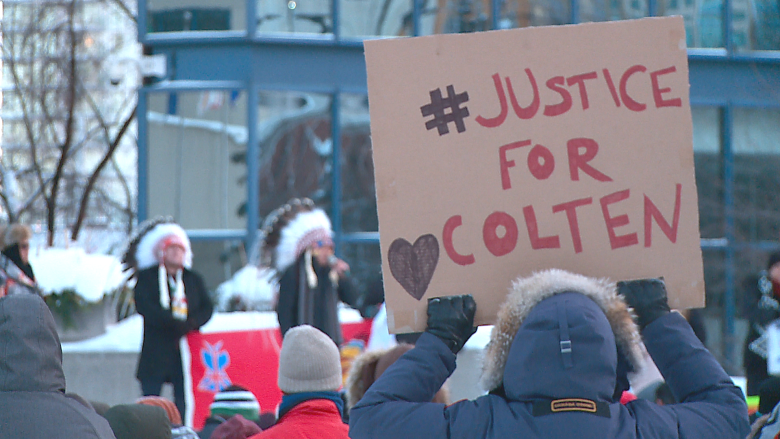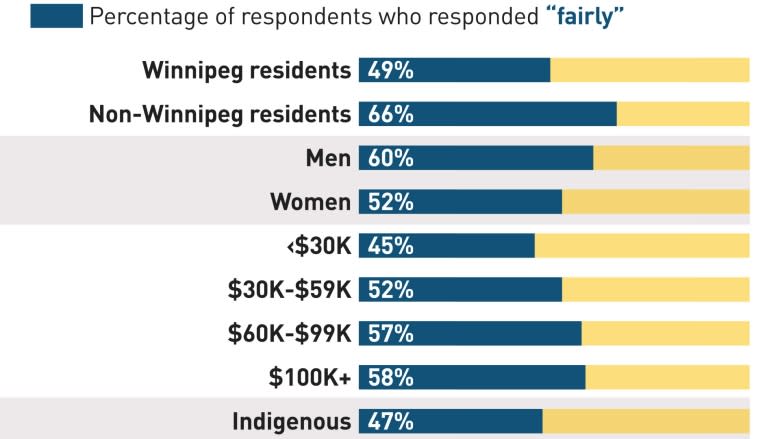Manitobans split on whether justice system is fair to Indigenous people, Probe poll suggests
Nearly half of Manitobans think the justice system treats Indigenous people unfairly, a new poll suggests — but a small majority disagree.
Forty-four per cent of Manitobans said no when they were asked whether the justice system was fair to Indigenous people in a Probe Research poll done in March. Fifty-six per cent said yes to the same question.
The question has been at the forefront of public discussion following two high-profile acquittals earlier this year of white men accused of killing young Indigenous people.
Gerald Stanley was acquitted in the shooting death of 22-year-old Colten Boushie in Saskatchewan in February. Two weeks later, Raymond Cormier was found not guilty in a Manitoba courtroom of second-degree murder in the death of Tina Fontaine.
The acquittals were followed by protest rallies and marches across the country and calls for change to the justice system.
In consultation with the Winnipeg Free Press, Probe polled a random sample of 1,000 Manitobans between March 12 and 29. With a sample of 1,000, Probe says it can say with 95 per cent certainty that the results are within 3.1 percentage points of what they would have been if the entire adult population of Manitoba had been surveyed.
Respondents were asked the following question:
"Two recent high-profile murder trials in Canada concerning the deaths of two young Indigenous people — Colten Boushie in Saskatchewan and Tina Fontaine here in Manitoba — have led to public discussion about the way Canada's Indigenous peoples are treated by the justice system, including by the police and the courts. All things considered, in your own view, would you say that Canada's Indigenous people are treated fairly or unfairly by the Canadian justice system?"
Probe senior researcher Mary Agnes Welch said she was struck by the near-even split and how many respondents said unfairly.
"Canadians like to think that we're a fair country, that our justice system is one of the best ones, that it's colour blind, that we're doing things in a good and proper way," she said.
"I think when you have that many people in Manitoba saying, 'Actually, we're a little worried about this. We don't think the system is generally fair to a significant group of people in our province' — that's a hard thing for Canadians to admit."
Rural-urban, political differences
Welch said the near-even split shows Manitobans are "of two minds" on the question.
The survey also found "notable variations" in opinion based on the characteristics of respondents. Winnipeg residents, women and people in lower-income households were all more likely to say Indigenous people are treated unfairly.
Just under half of Winnipeg residents — 49 per cent — said the system was fair, compared to 66 per cent of non-Winnipeg residents.
Seventy-six per cent of provincial Progressive Conservative supporters said the system was fair, compared to 33 per cent of NDP supporters and 41 per cent of Liberal supporters.
Less than half of Indigenous people felt the system was fair — 47 per cent — compared to 58 per cent of non-Indigenous people.
The single poll question didn't ask Manitobans if their views had changed in light of the Stanley and Cormier acquittals.
Respondents weren't given an "unsure" option, Welch said. The structure of the question forced people to respond based on their gut feeling, she said, whether or not they felt they were experts.
"In the last few months, there's been really strong, articulate, public, loud voices on both sides of the issue," she said.
"There's been this debate and it's been a really intense debate, and it's really important to get underneath that — how is this resonating with average people?"
The response raises many more questions about how people feel about the justice system, Welch said.
"A system has to have the confidence of Canadians in order to be legitimate. To have genuine authority over the affairs of the province and of the country, it has to have the confidence of the people," she said.
"I think in this one area, there's a question about whether Canadians have confidence in the full breadth of the justice system and how it treats one small but vital group of citizens."



